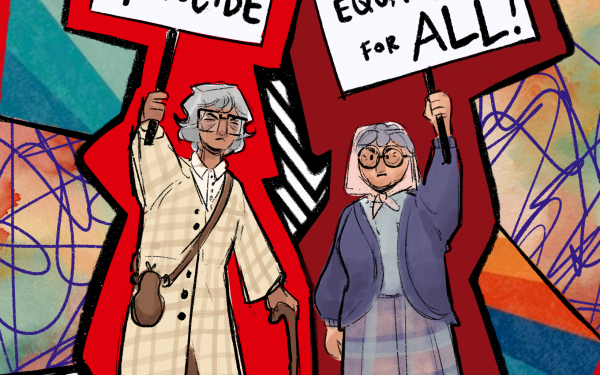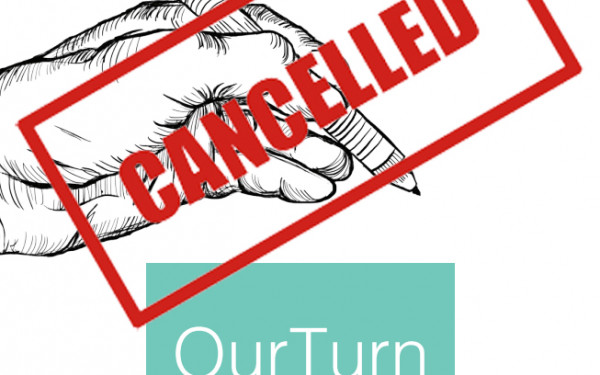How a labour historian turned YouTuber carved out his own career path online
Graphic Joey Bruce
Christo Aivalis leverages online platforms to cover politics from a left-wing perspective perspective
A white wall-mounted bookshelf, filled with manuscripts of all subjects related to Canadian history, is projected from the screen of a computer.
From Trudeaumania, to a volume of academic journal Labour/Le Travail, and works by labour historians like Ian McKay, many books stood out neatly in the recording office of YouTuber Christo Aivalis. As he prepared for this Zoom interview, facing his camera and adjusting his microphone, he set himself up as if he was ready to record another YouTube video.
Aivalis has a doctorate in labour history from Queens University and is passionate about political analysis from a left-wing perspective. He covers American and Canadian politics almost daily on his Youtube show and through his writings in Canadian Dimension, Passage and Macleans magazine. Since early 2019, he has uploaded over 1,000 videos on his YouTube channel, which has over 45,400 subscribers now. Through YouTube’s ad revenue, donations via Patreon, and his writing, he makes a modest income
“The channel really started to get momentum, around the time that the US primary was going on. It really kicked in my viewership and my subscriber base grew,” he said. “YouTube was something that I could do that generated some income and that allowed me to still be the primary caregiver to my child.” Both him and his wife have been working during the pandemic and live comfortably with their two-year-old son.
Moving away from academia, aware of low job opportunities in the field, Aivalis realized very quickly that he would need to find a way to make a voice for himself.
“Most of my commentary now is on YouTube, but over the past few years, I
have done a lot of commentary in mainstream Canadian media. Everything from AM talk radio to the CBC, CTV and Global,” said Aivalis. However, while he was developing a career, the lack of independent space sparked his drive to do more independent content.
“I’m doing these interviews and it’s not like I’m being censored. It’s not like I can’t take a left-wing position, or I can’t criticize the Liberals or the Conservatives—cause I did that a lot—but you’re sort of constrained by the framing of the interview and the questions being asked,” he said.
“YouTube was something that I could do that generated some income and that allowed me to still be the primary caregiver to my child.” — Christo Aivalis
His job routine is typical of a nine to five but with more flexibility. In the morning, he gets up, takes his son to daycare, and once back home, he begins working on various projects. He mentioned that uploading videos has been a much easier task now that his son is back in preschool, as he would have to work on videos around nap times during the summer.
Although the job has flexibility, Aivalis often must make himself available to work in the evenings. “It’s somewhat challenging to balance everything,” he said. “But then again, it’s the sort of thing that does give you flexibility in a way that another traditional nine to five job might not.”
“There are times where you know something [in the news] will happen and it’s a little late so I don’t need to make that video right away. I’ll think about it overnight. I’ll get up in the morning, and I’ll make the video,” he said. However, the 24/7 news cycle of online media means that he needs to be ready to upload a story at a moment's notice. “Other times, there’s a breaking news story and I can make a quick little video about it and capture a lot of interest,” said Aivalis.
YouTube as a platform is a balancing act according to Aivalis. For smaller political channels, making income means choosing topics that will appeal to a mass audience. Content creators generate income through ad revenue, and that requires a volume of viewership.
“You get so many fractions of a cent basically per view but over thousands of views,” he noted. “So I’ve tried to find myself trying to make content which is often American focused because that’s where there is a larger audience.” At the beginning of 2020, his channel had around 8,000 subscribers. Once he started covering the American elections earlier in the year, the YouTube algorithm picked up his content and his viewership skyrocketed.
“In the past, I would say a good day on my channel might generate 15,000 views, but now a good day on my channel might be two or three times that, and that’s outside of an election period,” he explained. The reality of being a Canadian political commentator online is that Canadian politics do not attract that large of an audience—nor that big of an interest on social media.
“I think part of it is that Americans are only interested in American news for the most part, but Canadians are interested in both,” he pointed out. When it comes to writing about Canadian politics, he has published pieces in Maclean’s, The Globe and Mail, The Washington Post, and more recently, for left-wing outlets such as Jacobin and Canadian Dimension. Articles are often more reliable as pay is delivered in a flat amount compared to Youtube. “Whether it’s $100 or more, it doesn’t necessarily have to get 30,000 clicks to be economically viable,” he said.
While being a one-man team does have its freedoms, working as a Youtuber can be challenging. Demonetization can become a real issue for content creators that rely on the website’s ad revenue to make a living. Certain keywords, topics, or words spoken in a video can trigger demonetization. Once a video is demonetized, ad companies will block their advertisement from showing up on a video, meaning reduced income for the creator.
“There’s like a libel chill so even if you don’t get sued, in the back of your mind, you think there is the potential for it,” he said. “You’ll sort of change how you talk about a topic because you fear that it will make the video demonetized.” On top of the
loss of income once they are marked as demonetized, it also reduces the ability of new users to see these videos on their feed even if it correlates with their interests.
Aivalis is looking forward to the upcoming projects he has planned. “I’m still working with another person to launch a podcast. It’s been slowed down by a bunch of things, but we’re still looking into it.”
Nearing the end of our conversation, he was excited to share that he was writing his first piece for Jacobin, an American magazine that covers politics, economics, and culture from a North American socialist perspective. His article, “By Voting Against a Wealth Tax, Canada’s Politicians Have Shown Who They Really Work For,” was published in December.




